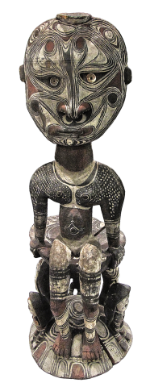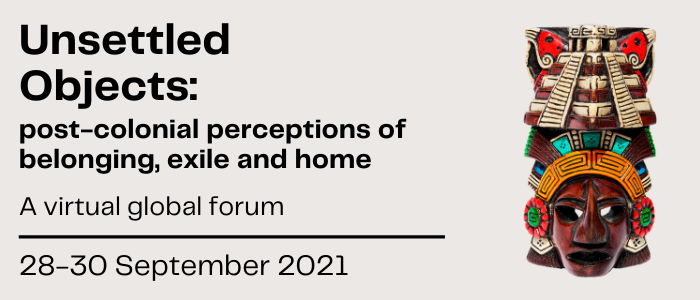Unsettled Objects: post-colonial perceptions of belonging, exile and home
Virtual global forum 28-30 September 2021
 An evaluation of centuries of European colonialism is at last emerging and moving to centre stage. Museums, archives, universities and related institutions whose own histories are inextricable from colonialism are being forced to examine their practices unquestioned for centuries.
An evaluation of centuries of European colonialism is at last emerging and moving to centre stage. Museums, archives, universities and related institutions whose own histories are inextricable from colonialism are being forced to examine their practices unquestioned for centuries.
For many indigenous peoples their history, identity, culture and traditions are often contained within their artefacts. However, for over 300 years many activities associated with colonialism have resulted in colonised peoples being physically separated from their material heritage which may now exist only in museum or archive collections.
How can entrenched ways of seeing, collecting, conserving, and curating the knowledge and material inherited from imperial collecting become inverted, subverted, and diverted?
How can colonial institutions function as both a target of criticism and a means through which colonising nations re-evaluate their colonial past?
Can museum objects themselves act as catalysts for critique and reinvention?
The volume of demands for accountability, transparency, and repair for injustice past and present is increasing. Conversations are often harder to hear than accusations, condemnation or dismissal. We want to start these conversations.
Themes for Unsettled Objects: Global Repatriation Forum:
- Place: Who decides whether an object or objects are in the right place? How do we define that place? Do objects have a ‘home’
- Relationships: objects define and can be defined by their relationships with people and cultures. Objects can tell many stories, sing many songs. Whose stories are we listening to? How do the stories that get told affect the objects?
- Fragmentation and dispersal: Often the true importance of sacred objects to the people and cultures who created them are obscured or hidden. They may only be whole when united with the legends, songs, and ceremonies associated with them. Can the material objects survive the separation from their sacred intangible whole? What is lost when a collection is fragmented and dispersed? Who loses? Who gains?
Contributors
- Alexandra Alberda (Manchester Museum) - Comics and Belonging: Relationship-focused and Fragmented Stories
- Noorah Al-Gailani (Glasgow Museums) - Unsettled objects: Heirlooms that have to leave their homelands with their owners
- Khadijeh Baseri (National Museum of Iran) - Persepolis treasury tablets
- Katie Bruce (Glasgow Museums) - Unsettled Objects: a catalyst for rethinking the relationship of a modern and contemporary art to a museum’s collection
- Neil Curtis (University of Aberdeen) & Eve Haddow (University of Queensland) - Caring and Sharing: curating the cultural collections in the University of Aberdeen
- Stephanie de Roemer (Glasgow Museums) - Conservation conversation: caring for ‘unsettled objects’
- Anthony Kalume (University of Brighton) - The Vigango Resting Place Project
- Minhazz Majumdar (Curator) - Contemporary Traditional Arts of India: Paradox or Reality
- Laura Phillips (Queen's University, Kingston) - A Settler View from Ongoing Colonized Lands
- Fatemeh Safaii Rad (London Metropolitan University) - The need for revised museological interpretation of Persian carpets
- Motsane Getrude Seabela (DITSONG National Museum of Cultural History) - Looting in the Name of the Lord: in Search of Home for the Reverend William Govan Robertson Objects
- Giovanna Vitelli (Hunterian Museum), Alma Nankela (National Heritage Council of Namibia) and Jeremiah Garsha (University College Dublin) - Acknowledging and Restoring Relationships and Belongings
- Francesca Zappia (RILA Affiliate Artist) - Objects on an Enlightening Mission. The casts of French abolitionist Victor Schoelcher
Please click here to read the full programme.
If you have any questions or comments please contact Bella Hoogeveen in the UNESCO RILA Secretariat at unesco-rila@glasgow.ac.uk.
Register for FREE on Eventbrite

Call for contributions (for reference only)
Glasgow Museums & UNESCO RILA at the University of Glasgow present:
Unsettled Objects: post-colonial perceptions of belonging, exile and home
A virtual global forum, which takes place on 28-30 September 2021
An evaluation of centuries of European colonialism is at last emerging and moving to centre stage. Museums, archives, universities and related institutions whose own histories are inextricable from colonialism are being forced to examine their practices unquestioned for centuries.
For many indigenous peoples their history, identity, culture and traditions are often contained within their artefacts. However, for over 300 years many activities associated with colonialism have resulted in colonised peoples being physically separated from their material heritage which may now exist only in museum or archive collections.
How can entrenched ways of seeing, collecting, conserving, and curating the knowledge and material inherited from imperial collecting become inverted, subverted, and diverted?
How can colonial institutions function as both a target of criticism and a means through which colonising nations re-evaluate their colonial past?
Can museum objects themselves act as catalysts for critique and reinvention?
The volume of demands for accountability, transparency, and repair for injustice past and present is increasing. Conversations are often harder to hear than accusations, condemnation or dismissal. We want to start these conversations.
Call for contributions
We invite anyone working within the context of cultural conservation, mediation, presentation to present at this 3-day online event. We welcome proposals for interactive workshops, poster sessions or Pecha Kucha presentations.
Themes for Unsettled Objects: Global Repatriation Forum:
- Place: Who decides whether an object or objects are in the right place? How do we define that place? Do objects have a ‘home’
- Relationships: objects define and can be defined by their relationships with people and cultures. Objects can tell many stories, sing many songs. Whose stories are we listening to? How do the stories that get told affect the objects?
- Fragmentation and dispersal: Often the true importance of sacred objects to the people and cultures who created them are obscured or hidden. They may only be whole when united with the legends, songs, and ceremonies associated with them. Can the material objects survive the separation from their sacred intangible whole? What is lost when a collection is fragmented and dispersed? Who loses? Who gains?
Submission guidelines
As this is a virtual event, we are asking contributors to be creative in their use of the virtual space, their time and in their way of engaging with the audience. All sessions must have an interactive element.
If you have an idea for a session, but you're not sure how best to present it in this context, we are more than happy to talk about it. Just send us an email to unesco-rila@glasgow.ac.uk and we will get back to you to schedule a call.
Please be aware that the size of the audience can vary and that sessions will be scheduled in the morning, afternoon and evening, to accommodate a range of time zones. If you have a preference for a particular time, please write that in your proposal and we will do our best to honour your request.
Please send your submission to unesco-rila@glasgow.ac.uk as a written proposal of maximum one side A4 (11pt Arial) or as a link to an audio/video recording of maximum 3 minutes.
Please include the names of the people involved in your session, as well as the name(s) of the organisation(s) they are from. Clearly state how much time you need, preference for time of day and if your session is a workshop, poster presentation or Pecha Kucha. Describe your session and which theme you will be addressing (see themes above).
Deadline for submission is midnight on 30 August 2021.
Proposals will be reviewed the following weeks and you will be notified of the outcome by 3 September 2021.
Fees: The organisers cannot pay fees to those who will present. If your session involves expenses, please state this in your proposal.
Childcare: If you will require childcare in order to contribute, please get in touch with us as soon as possible, to see if we can assist or partially subsidise childcare as required.
If you have any questions, comments or would like to discuss your ideas, please contact Bella Hoogeveen in the UNESCO RILA Secretariat at unesco-rila@glasgow.ac.uk.

